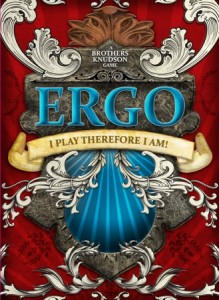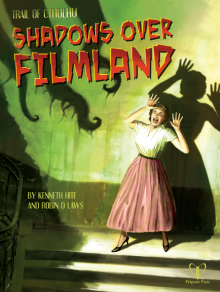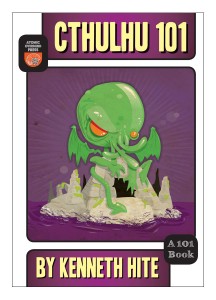For me, this past Gen Con was more about shopping and conversation than it was about playing actual games. This was a terrible mistake on my part. I could’ve been having conversations while I was playing games, but I didn’t quite manage to pull that off.
It’s not like I didn’t play anything, though. For example, I got to play (at last!), but didn’t buy, the Diana Jones-award winning card game of fantastical deck-building, Dominion, thanks to Andrew Hackard and Paul Tevis being on the ball and on the Twitter. Better still, I got to play it in a bar, which is a fine place for playing card games. (Also a fine place to spill beer on card games, it turns out.) Readers of Things We Think About Games take note: Dominion, in addition to being brilliant and perhaps airtight, legally violates Thing #24. I couldn’t find a way to shuffle the discard pile early.
But this is a post about what I spent time buying or selling. On with it.
Games
On Saturday, I spent a few hours in the game-hall demo space for Catalyst Games, running some demos and eavesdropping on others. Catalyst has a fleet of new casual games coming, covering themes like high-school drama, shit-hurling monkeys, European conquest, and self-annihilating logic. I, of course, was running demos for that last one, called Ergo. Properly a game not just about logic but built around it the way a well is built around a spring, Ergo is a game I am not personally smart enough to demo all that well. Good news, then, that every player who tried it was already so well versed in logic and epistemology that they not only grokked the game immediately, but understood what they liked about it. Ergo uses the language of logic as its core rules, with cards simply turning a proof into a competition to prove that you exist… and the other players do not. Good game, ripe for use in schools (though it could stand to consider Thing #20).
I got my copy of the amnesiac-therapy game, A Penny For My Thoughts, back at Origins, and it’s a good thing, too, since the book sold out at Gen Con. I did get mine signed at Gen Con, though, by my friend, writer/designer Paul Tevis. Alas, I didn’t get to play the thing, which is probably my own damn fault.
While touring the floor with Paul, and swimming in my own dreary fog of sleepiness, I also picked up a copy of Savage Worlds: Explorer’s Edition (for the famous price of ten bucks) to replace a copy that I’d lost somewhere along the line. (At $10, I may have just given it away.)
Alack, I also missed out on a few books I’d been hoping to get, but which sold out before I could nab them. I’m thinking here of Posthuman Studios’ Eclipse Phase, which I mentioned earlier, and of Mysteries of the Hollow Earth for Exile Games‘ Hollow Earth Expedition (HEX). Both books are good-looking hardbacks for adventure games of very different sorts — though in both you can play animals that do people things: In HEX you can play a gun-toting chimpanzee philosopher with spectacles and a leather-bound tome, while in Eclipse Phase you can play a treacherous human-brained octopus with next-gen goggles and a holographic computer array. These are signs of imminent adventure, they are.
By chance, I happened to pick up the Gen Con sampler for Gregor Hutton’s AD 316, which I grabbed on sight, though I haven’t even played with my PDF of 3:16 Carnage Amongst the Stars, yet. Hopefully I’ll get to play AD 316 sometime not too long after I’ve seen Rome again.
The bulk of the space in my luggage, though, was taken up by Pelgrane Press, whose 4-for-3 sale cunningly tricked me into buying things at the show that I could get online easily enough. Getting a free book, though, was too good a deal, especially when I was likely to get all four of these eventually anyway: Shadows Over Filmland, Rough Magicks, Arkham Detective Tales, and Hard Helix. You know what I can’t get online, though? Shadows Over Filmland with an original sketch by Jérôme Huguenin, signed by Robin Laws, Kenneth Hite, and Simon Rogers. It’s like my GUMSHOE Yearbook. Now all I have to do is find some time to play with these books.
I also picked up Chronica Feudalis, after playing a super-short demo of it at the IPR booth, but I’ll write more about it after I run it tomorrow night.
Stories
Ryan Macklin was kind enough to give me a copy of his Finis: A Book of Endings, which was put together to raise money for Katrina victims. The book’s a collection of short endings, mostly sad, to Choose Your Own Adventure-style tales that don’t otherwise exist. It’s a curious and inspiring thing, to be sure. Reading it made me want to be writing, straight away.
Looking for something to read at the airport during the hour I had to keep myself awake on Sunday morning, after running for 20 hours on 5 hours of floor-quality sleep, I said to myself, “I haven’t checked in with Paizo’s Planet Stories outfit in a while. They’re sure to have something good.” A short chat with the Planet Stories editor later, I had subscribed to the Planet Stories line and come away with a copy of Leigh Brackett’s The Ginger Star as airport reading. If you dig pulpy planetary adventure, it’s good stuff. The Planet Stories line continues to impress, mixing great reprinted novels with new introductions by genre giants like Michael Moorcock, George Lucas, Tim Powers, and China Miéville. I figured I should get on board that rocket ship.
Of course, I must also mention the Cthulhu media primer that, when announced, made the Internet gasp and say, “Why didn’t we have this book before?” It’s Cthulhu 101 (not to be confused with Cthulhu 500), Atomic Overmind’s guidebook to that geek touchstone most unearthly and most terrible, Great Cthulhu. Written by Ken Hite (because we do not live in a truly orderless universe), this is the tiny tome you give to your non-geek friends to help them understand why octopus-headed godlike monsters are so scary, funny, and scary again, to the point that Cthulhu dominates (or lurks beneath, dreaming) so much of geek humor. (This is when I plug my own Cthulu gag, from back when.) In this pocket-sized guide, Hite explains why Cthulhu is like unto, but more excellent than, Godzilla, Darth Vader, Megatron, and Voldemort, all at once. In fact, he probably does that in less than 100 words. The rest of the book shows you around Cthulhu culture, from literature to games and beyond. Buy this book and get in on the joke.
Whew. So, there. Now that I’ve unpacked, I can maybe get on with deeper posts about what I learned while demoing Ergo, what I’ll learn tomorrow while playing Chronica Feudalis, and what I just found in my drafts folder, left over from a year ago. Stay tuned.




Dominion does, in fact, have a card that lets you shuffle the discard pile early: the Chancellor. We didn’t play with that one.
Yeah, I’m interested in knowing more about Ergo.
OK, cthulhu.com, “music, videos, elder tomes”, that’s funny.
-Ry
Andrew, I should’ve guessed Dominion had that covered already.
Seth, I’m trying to get in touch with the designer of Ergo for an upcoming post. Stay tuned.
Thank you, lieutenant.